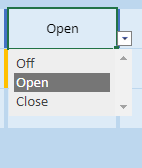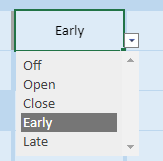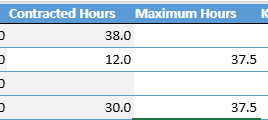Optional Features
The Rostering for Childcare application by Daitum has optional features that can be activated via the Support Desk. Features can be activated at an individual centre level allowing partial or staged rollout of features.
Early Late Work Preferences
The ‘Work Preferences’ view allows setting of when people work and the type of shift they should receive. The Early Late Work Preferences feature introduces two additional options to the dropdown.

Early Late Work Preferences Off

Early Late Work Preferences On
By Default this setting is turned on and a support request is required to switch it off.
Certification Compliance Check
The Certification Compliance Check feature enables an extra field on the Payroll view for recording the date of expiry for any certifications. Daitum will not roster any day that is later than the day listed for the expiry date. If left blank, all days will be rostered.
Only some integrated payroll systems support this concept but values can also be manually entered. Daitum is eager to extend this concept across additional integration points whenever possible.
Strict Certification Compliance Check
When configured, anyone who has an expired WWCC (Working with children check) will not be rostered any shifts. Where the field is blank it is also treated as expired.
By Default this setting is turned off and a support request is required to switch it on.
Read-only Certification Expiry
When configured, the Certification Expiry is non editable on the Payroll View.
By Default this setting is turned off and a support request is required to switch it on.
Consistency of Shifts
The Consistency of Shifts feature ensures that staff receive the same start time and / or area for the entire week. The feature assists in the acceptance of Daitum generated rosters but has potential to create more expensive rosters. More details on how the Consistency of Shifts feature works is provided on the Shift Lengths help page.
Fixed Shifts
The Fixed Shifts feature allows specific shifts to be specified. Daitum will then optimise the remaining shifts to find the most optimal roster while still satisfying the fixed shifts specified. Rosters with a low amount of fixed shifts will still be efficient. Overuse of the Fixed Shift feature has the potential to produce less efficient or non-compliant rosters.
Paid Breaks
The Paid Breaks feature allows organisations to specify that part of the break Daitum is to schedule is paid, which ensures Daitum calculates the shift length correctly. In general Daitum does not schedule the ‘tea breaks’, but some organisations combine these breaks into a larger partially paid break, which the Paid Breaks feature supports.
Variable Shift Lengths for Part Time Staff
By default Daitum uses a fixed shift length or the maximum shift overrides on the Shift Lengths view.
With the Variable Shift Lengths for Part Time Staff feature, Daitum can identify an optimal shift length for the centre and give shifts of varying lengths each day.
With the feature active the Configuration - Defaults view provides 2 parameters to configure how long / short a shift can be:

Part time staff will then receive shifts between these lengths each day, attempting to meet the contracted - maximum hours range specified on the Staff- Payroll view:

This feature works best when a range is specified for the number of hours that can be worked.
Minimum Hours for Casuals
Casuals are usually rostered solely based on need, using the minimum hour per shift specified on the configuration defaults screen. However, some organisations guarantee minimum hours for their casuals. With this Feature enabled, the contracted hours and maximum hours on the payroll screen are honoured for Casuals.
QLD Rest Period
Some Organisations have ‘grandfather’ clauses that allow them to utilise the rest period ratios that allow the first person in the quota group to be at double the default ratio. (eg: a 4:1 ratio can be 8:1 for the rest period)
With this feature active the Configuration - Defaults view provides 2 parameters to configure the rest period:

Daitum will then use the rest period ratio during these times.
Expected Attendance Rate
Allows the configuration of an expected attendance rate that allows planning for absenteeism. The value is set on the Configuration Defaults screen once it is turned on.
By Default this setting is turned off and a support request is required to switch it on.
Tolerance for Ratio Coverage
Once configured, this allows optimisation to accept a configurable tolerance when evaluating ratio compliance. The value is set on the Configuration Defaults screen once it is turned on
By Default this setting is turned off and a support request is required to switch it on.
